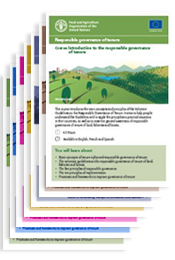Governance of tenure newsletter - December 2023
The “Voluntary Guidelines on the Responsible Governance of Tenure of Land, Fisheries and Forests in the Context of National Food Security” are referred to as the “Voluntary Guidelines" or the VGGT in this newsletter.
- Promoting inclusivity for improved local tenure governance in Sierra Leone and Mauritania
- FAO supports the launch of the Pacific Land Network (PLaNet) to inform practitioners and decision makers on customary land issues in the Pacific Islands States and Territories
- Improving customary tenure and governance in the Pacific Islands
- Combining forest monitoring and land mapping to support Indigenous Peoples in their key role as forest and climate custodians
- Other news
- Publications focus
- E-Learning
Promoting inclusivity for improved local tenure governance in Sierra Leone and Mauritania
By Francesca Romano, Coline Damieux, Ingeborg Gaarde, Yasmine Iqbal

© FAO/Aissata
Financed by the German Federal Ministry of Food and Agriculture (BMEL) and benefitting from the collaboration with the Ministry of Rural Development, Agriculture and Livestock in Mauritania and the Ministry of Lands, Housing and Country Planning in Sierra Leone, the 3 years long project on “Promoting inclusivity for improved local tenure” has kick-started. The focus will be on promoting a more inclusive and gender responsive local land governance and accountability mechanisms, through the strengthening of local institutions, participatory multi-stakeholder processes and data generation.
Specifically, in Sierra Leone, the project will focus on improving local land governance by reinforcing and capacitating local institutions - crucial in the implementation of the legislative framework - paying particular attention to the role of women and youth; promoting multistakeholder local dialogue on responsible governance; addressing in particular local government institutions, but also traditional leaders. . In Sierra Leone the project will also supports the development of accountability mechanisms, through the definition of country targets as part of the national land reform process, testing and application of assessment tools, promoting a Human Rights based approach.
Building on previous projects on land tenure governance, Mauritania works toward revitalizing and strengthening spaces for inclusive dialogue on land tenure issues, bringing all stakeholders together, including women and youth. To fit with the specific context and achieve these objectives, the FAO Land Tenure Team and Pastoralists Team are working hand in hand. In the first month of project implementation, as a first step, the National workshop on governance of tenure was held in Nouakchott on 18-19 October, chaired by the Ministry of Livestock in collaboration with the Ministry of Economy and Sustainable Development, gathering a broad range of stakeholders. The workshop led to a roadmap proposal for the land reform. This is organized around political, legal, social and environmental axes and proposes to: i) draft a national strategy for land management, ii) revise the legal and institutional framework to adapt it to the requirements of socio-economic development; iii) conduct an awareness-raising and advocacy process to protect the rights of vulnerable people; iv) implement systems to protect the land against flooding, degradation and other adverse effects of climate change. In addition, it was discussed how to overcome the challenges to ensure inclusivity and sustainability of the local and national platforms. More information on the workshop can be found here.
The project also concentrates on improving the inclusivity and functioning of transboundary transhumance committees to prevent or mitigate land related conflicts, through tailored capacity development activities and sensitization practices. The Second Edition of the Pastoral Week of the Mali-Mauritania-Senegal cross-border consultation groundwork was successfully held in Sélibaly (Mauritania) on 31 October-1 November and led to the adoption of the Framework agreement institutionalizing the plan for cross-border consultation and cooperation on pastoralism and transhumance. It was decided that the operationalization of the framework agreement will be undertaken by the Network of Mayors of the Senegal River Basin, building on the achievements of a previous FAO project on land governance in the Sahel region.
In Sierra Leone, the VGGT principles have guided the adoption of the National Land Policy, and more recently the new Customary Land Rights Act and Land Commission Act. The Country is now going through a profound land tenure system and administration reform process. For this reason, in the first phases of implementation, the project will support the piloting of an innovative land tenure governance assessment tool, based on Human Rights Principles, which would guide new interventions, and help a variety of stakeholders, governmental and non-governmental actors, to have an informed understanding of the level of adoption of the guidelines in the country.
FAO supports the launch of the Pacific Land Network (PLaNet) to inform practitioners and decision makers on customary land issues in the Pacific Islands States and Territories
By Antoine Hochet
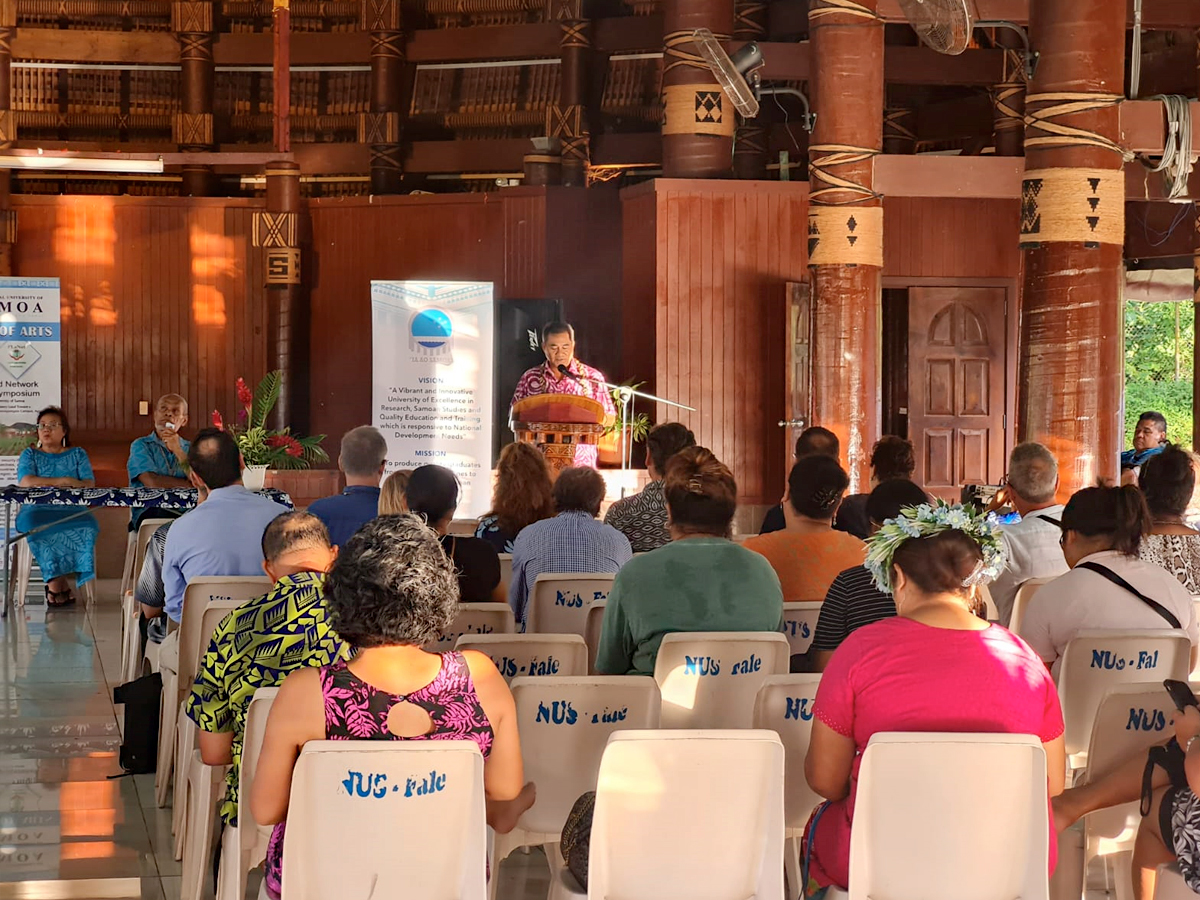
© FAO
On the 23rd to the 25th October 2023, a 3-day symposium was organised to present the state of the customary land tenure system in the Pacific Island States and Territories entitled “What Future for Customary Land Tenure in the Pacific?”. The forum brought together 23 academics, several civil society actors from 13 Pacific Islands States and Territories provinces of the country.
This event, opened by the Minister in charge of Land affairs, Honourable Toeolesulusulu Cedric Pose Salesa Schuster, initiated by the FAO Land tenure Team, with the support of the French Fonds de coopération économique, sociale et culturelle pour le Pacifique, and hosted by the National University of Samoa (NUS), gathered about 100 participants from 15 Pacific Islands States and Territories and others countries.
Pacific Island countries are experiencing the effects of climate change to a more extreme degree than most other countries. Natural disasters such as unprecedented storms, volcanic eruptions and tsunamis have destroyed large portions of the region’s economies. Higher tides and ocean overwash are displacing people from coastal areas and contaminating the groundwater, which in turn prevents crop growth and threatens food security.
Thus, the Pacific Islands already face a stark reality. On November 2023, Australia announced that it was offering asylum to the 11 000 inhabitants of Tuvalu, a Pacific archipelago where two atolls are already largely submerged by rising sea levels. Some 1 700 residents of Papua New Guinea - Carteret Island’s total 2 500 inhabitants have been named the world’s first environmental refugees; more than 20 000 Marshallese climate refugees have emigrated to the United States of America due to these extreme weather conditions. Cyclone Harold in 2020 or cyclone Pam, which blazed through Vanuatu in March 2015, left 75 000 residents without homes. Cyclone Winston in February 2016 — the worst storm to ever hit the Southern Hemisphere — took the lives of 44 Fijians.
In this region, mitigation and adaptation response to counter climate change are a vital priority. Nevertheless, in a region where some 83 to 97 percent of the land is held by customary owners, adaptation and mitigation policies must address the prominence of the customary governance of land tenure as it fundamentally structures the distribution of environmental resources and shapes the livelihood of Pacific Islanders. In this context, the embeddedness of indigenous knowledge and their customary practices into natural resources management policies are a prerequisite to counter efficiently and sustainably climate change effects.
So far, the Southwest Pacific lacked a regional expert group on land as it already exists in other regions providing land tenure expertise for decision-makers, promoting inclusive land policy dialogue within multi-stakeholders' platforms, and technically supporting the national land administration and judiciary system.
In this context of accelerating global environmental change, FAO supported the structuring of a regional Platform on Land in the Pacific called the Pacific Land Network (PLaNet). This knowledge hub will assess national land tenure issues, formulate policy recommendations for stakeholders and promote a regional dialogue and exchange of good practices in accordance with the Voluntary Guidelines for the Responsible Governance Tenure of Land, Forest and Fisheries in the context of national food security. The aim of the Pacific Land Network is to improve the knowledge of customary land tenure practice in the countries (states and territories, regardless of status) of the Pacific region to inform environmental policies, decision-makers, and project implementers to facilitate climate change adaptation and mitigation strategies in this region among the most vulnerable to climate change.
Improving customary tenure and governance in the Pacific Islands
By Safia Aggarwal
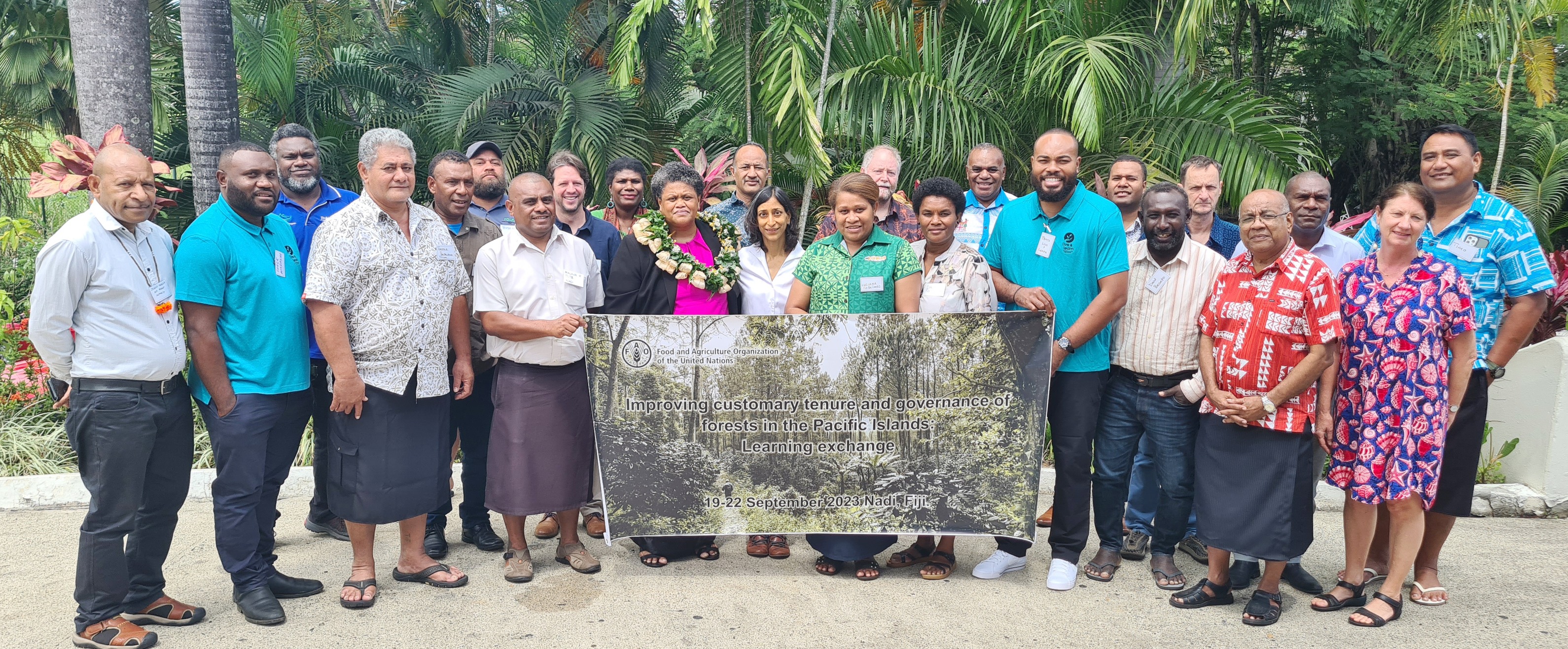
© FAO/Monica Coy
FAO Forestry in collaboration with FAO SAP and Fiji’s Ministry of Fisheries and Forestry organized a four-day workshop on “Improving customary tenure and governance in the Pacific Islands” in Fiji from 19 to 22 September 2023. A total of 22 participants attended from six countries: Fiji, Papua New Guinea, Samoa, Soloman Islands, Tonga, Vanuatu. Participants included representatives from the government, non-government organizations (local/national and regional), private sector, university, research institution.
The learning exchange was organized to learn from good experiences in management of forests on customary lands in the Pacific as well as the better practices and guidance emerging from experiences on customary land governance from other parts of world. The workshop focused on a range of topics: i) Strengthening decision-making in customary institutions, promoting downward accountability of customary leaders; ii) Adopting inclusive and transparent governance structures, and enhancing participation of women and youth; iii) Developing community bylaws and land/natural resource management plans; iv) Improving processes of land and forest management through collective planning;
v) Ensuring tenure security of all community members, empowering individual rightsholders to invest in their lands; vi) Addressing land and natural resource related conflicts, using community-based paralegals; vii) Engaging with the private sector and negotiating contracts with investors through responsible in-vestment models; and viii) Promoting community-based forest/tree enterprises.
A one-day field visit was organized to Fiji Pine Limited and Fiji Pine Trust allowing participants exposure on how a private sector is respecting customary rights of communities by engaging and strengthening participation of landowners into its diverse company operations.
Participants appreciated the learning exchange. One participant noted: “A very important program that should be taken down to the national level, involving wider range of stakeholders with responsibility to land tenure and resource management.” Participants offered several recommendations for follow on activities including: i) holding similar events in other countries; ii) holding regular events (every 2 years) and exploring specific topics in more depth; iii) organizing the learning exchange at the national level, Iv) involving wider range of stakeholders with responsibilities inland tenure and resource management; v) holding follow on learning events on how participants use the knowledge learned to improve their areas of work; vi) establishing platform for sharing of better practices; vii) building in greater emphasis on identifying and responding to specific capacity gaps in each country and across region; viii) creating specific opportunities for women to attend and voice their perspectives. Several participants also noted the need for studies and documentation to identify models of successful community based and rural enterprises existing in the region. A large number of participants from the various countries noted the need for initiation of work on community-based paralegals in their countries. In addition, PNG participants requested to expand plantation forestry with customary landowners, support community-based forestry enterprises, promote legal awareness, and facilitate negotiation of fair contracts between communities and the private sector.
The learning event received publicity within Fiji through a Fiji Times article submitted by the Ministry of Fisheries and Forestry: https://www.fijitimes.com/pacific-forest-experts-exchange-ideas/
The use of good governance principles in customary governance of land and forests in the Pacific Islands is expected to facilitate protection of existing forests and restoration of degraded ones, mitigate climate change, bring economic benefits to customary rightsholders, and contribute to the national economy.
The workshop report provides further detail on the learning exchange context/purpose, the key takeaways/highlights, suggestions for improving future learning programmes on the topic, and recommendations for follow-on activities.
Combining forest monitoring and land mapping to support Indigenous Peoples in their key role as forest and climate custodians
By Ward Anseeuw and Marieke Sandker
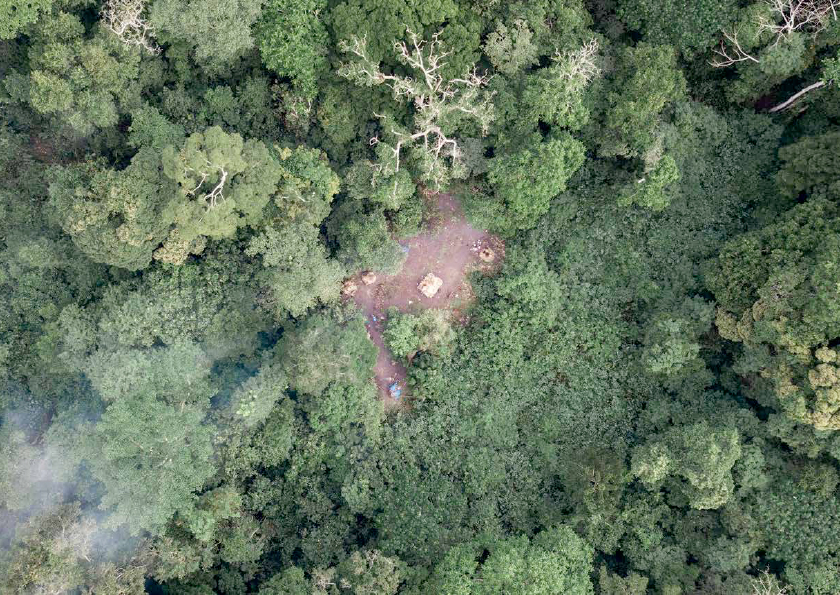
© FAO
There is increasing recognition of the key role of Indigenous Peoples as the most effective custodians of vast areas of forest. This recognition has resulted in emerging opportunities for climate finance, as present standards and programmes allow submissions from recognized indigenous territories, potentially unlocking hundreds of millions of USD in finance for Indigenous Peoples. This, in turn, would add to the capacity of the indigenous territories to gain recognition for their territories and combat encroachment. However, major barriers exist, preventing the incorporation of Indigenous Peoples, their (land) rights and traditional knowledge into the design and implementation of jurisdictional climate finance programmes. It also limits the participation of Indigenous Peoples in monitoring the implementation of these programmes as well as of related forests, lands and natural resources.
The AIM4Forests programme will broaden participation in forest monitoring by providing tailored technical solutions for Indigenous Peoples, supporting their efforts for recognition of their territories and enabling access to emerging climate finance opportunities. The programme’s aim is to accelerate the alignment, innovation and deployment of innovative technical solutions and novel learning approaches through regional, local and indigenous-led communities-of-practice. The Programme will highlight the key role of Indigenous Peoples as custodians of forests in the forest and climate agenda, and improve the quality of data in LandMark, the global platform of Indigenous and Community Lands. It will enable more local stakeholders to map their territories, increase the visibility and recognition of indigenous territories and thereby facilitate those who aspire to pursue climate finance to do so.
AIM4Forests is helping Indigenous Peoples in their efforts to conduct their own forest monitoring, develop their own land and forest data, and support their own cases in the climate and forest space. This will both strengthen the rights of Indigenous Peoples as custodians of forests and other resources and enable more inclusive, equitable and sustainable benefit-sharing. The increase in forest-monitoring capacity will ultimately strengthen the position of Indigenous Peoples in claiming climate-related results-based payments by improving the mapping of their territories.
Given that overall, about 50 percent of the world’s lands are owned and occupied by Indigenous Peoples, their empowerment through the collection of high-quality data on their mapped lands has potential application over vast areas. As an example, as of September 2023, 26 governments had submitted eligible proposals to the LEAF Coalition, although only one of these (from the Plurinational State of Bolivia) concerns a recognized indigenous territory. For the LEAF Coalition to succeed, it is important to ensure that Indigenous Peoples are equally recognized in the remaining 25 proposals, giving them a fair share of the benefits. A forest monitoring tool for mapping forest lands managed by Indigenous Peoples and its visualization in LandMark can help increase the visibility of indigenous territories and ensure fair benefit-sharing arrangements that recognize the crucial stewardship role of Indigenous Peoples in protecting and managing forest resources.

Chad validates its National Land Policy
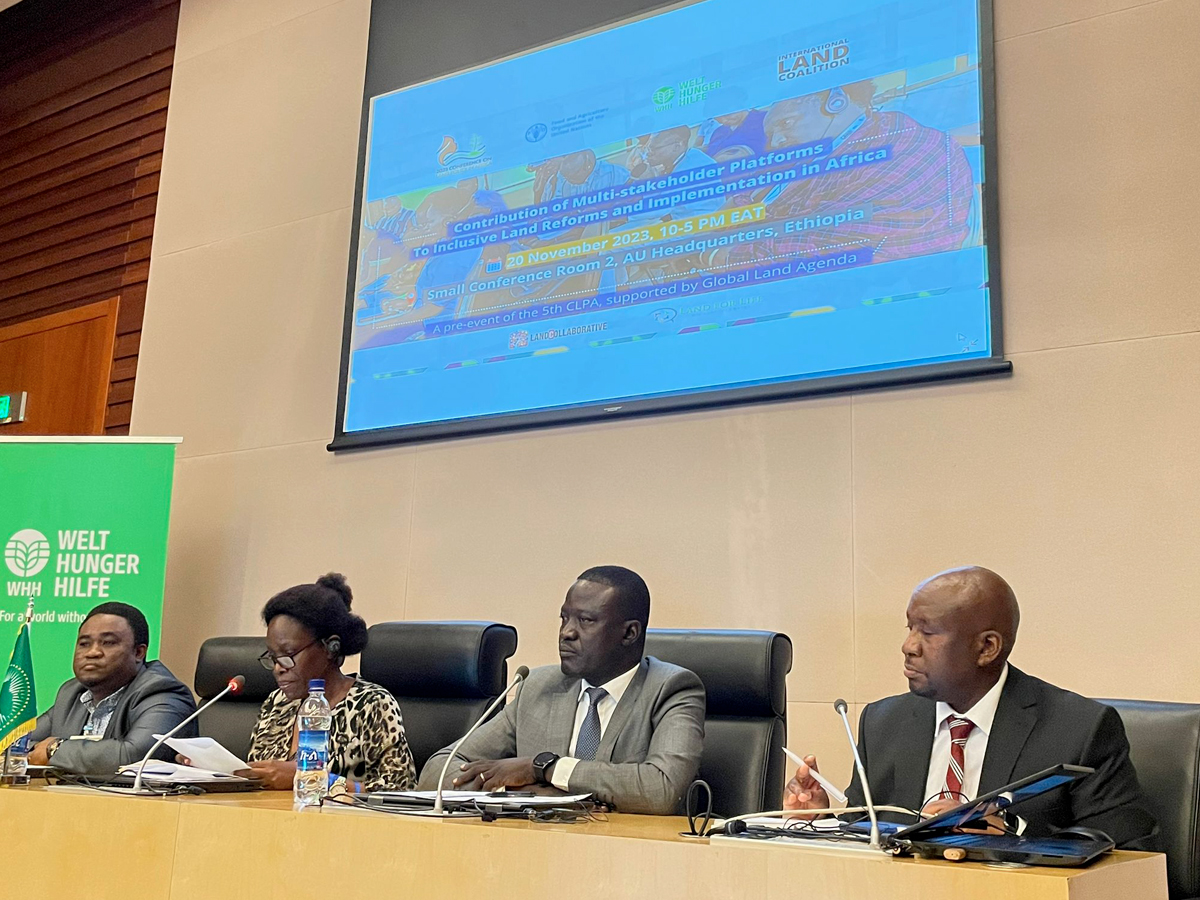
FAO and Partners advancing Inclusive Land reforms at the 2023 African Land Policy Conference

Securing tenure rights to increase food security
Tenure rights are crucial to the livelihoods of people as they define who can use which natural resources, for how long, and under which conditions. Tenure of natural resources is also essential for environmental sustainability and increased resilience and for enabling farmers to access other services.

In line with the VGGT, public and private investments globally are increasingly recognising responsible land governance as a determinant for the success and sustainability of their achievements. Investment managers understand that preventing and mitigating tenure related issues is a necessary step to achieve their objectives. This guide provides readers with a basic understanding of the functional linkages between land tenure and land-based investments.

Lessons learned from the introduction of land consolidation in North Macedonia during 2014–2023
Since 2014, North Macedonia has developed into the flagship country for FAO support to land consolidation in Europe and Central Asia. The first small technical assistance project began in 2014. During 2017–2022, support to the national land consolidation programme was scaled up with European Union IPA funding through the FAO-implemented MAINLAND project.
A wide variety of e-learning courses are available on the Responsible Governance of Tenure. Learn about:
- making access to land, fisheries and forests more equitable
- how to protect people's tenure rights
- options to simplify the administration of tenure and make it accessible to all
- how to ensure disputes are resolved before they degenerate into conflict

